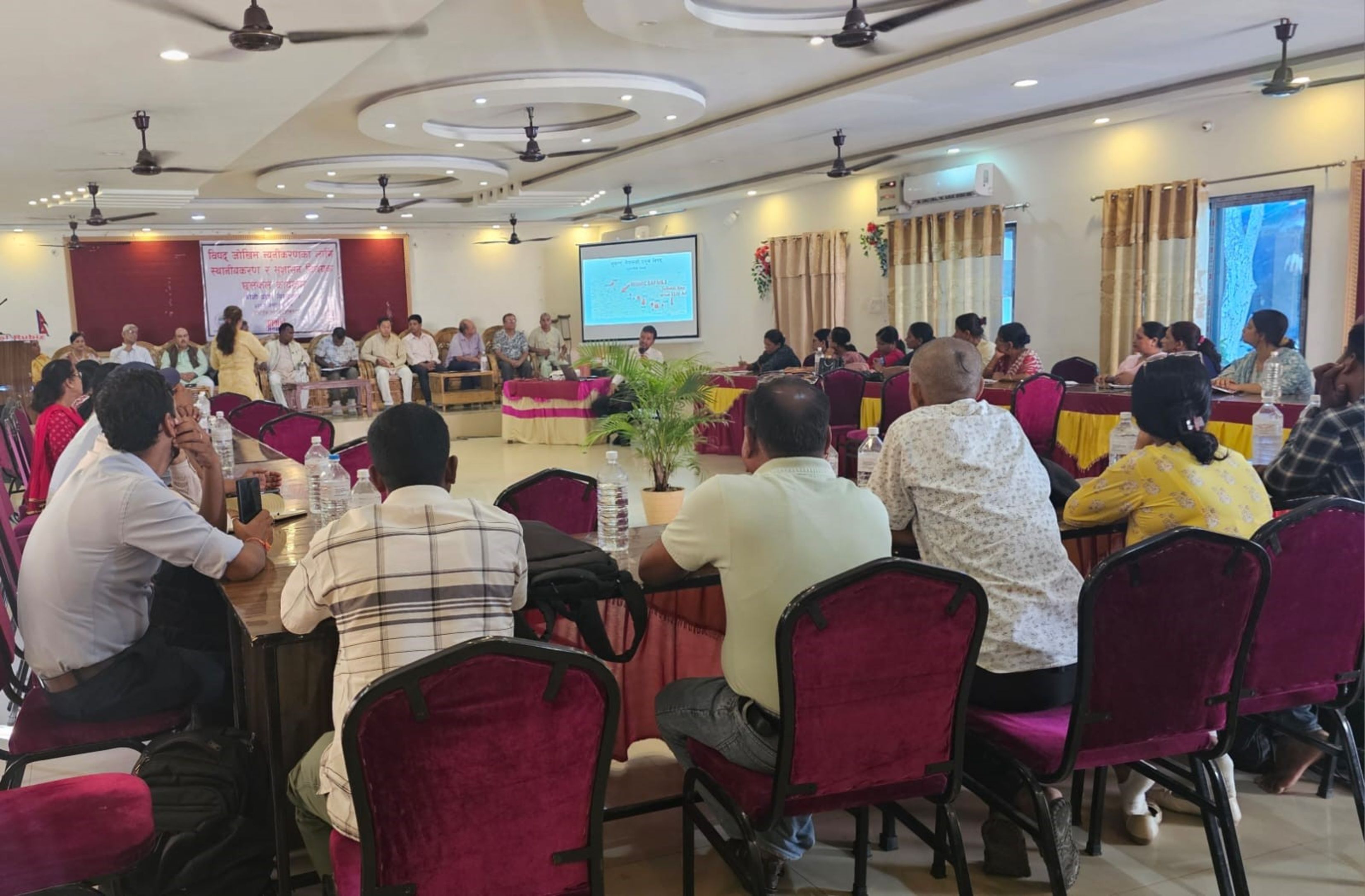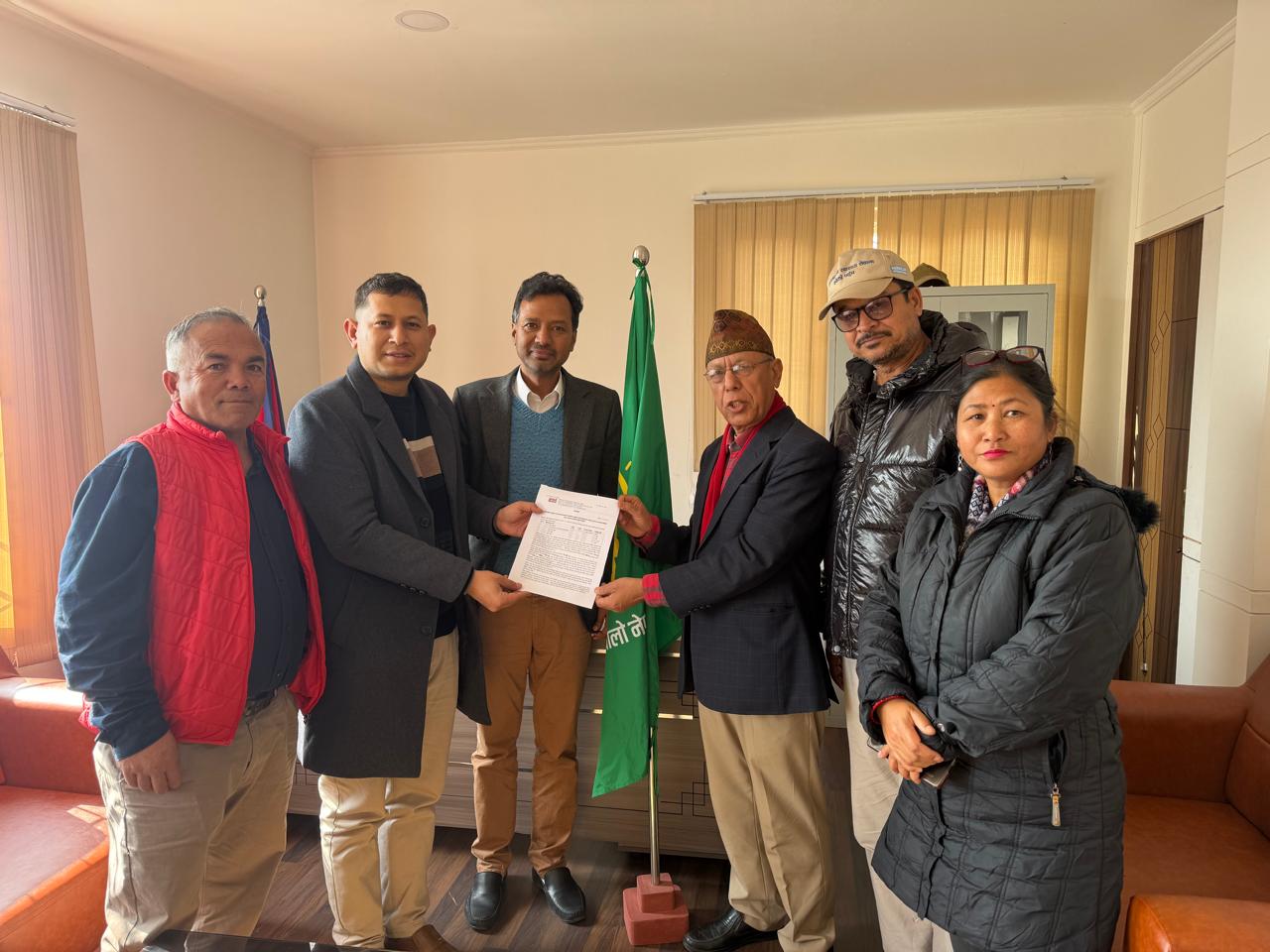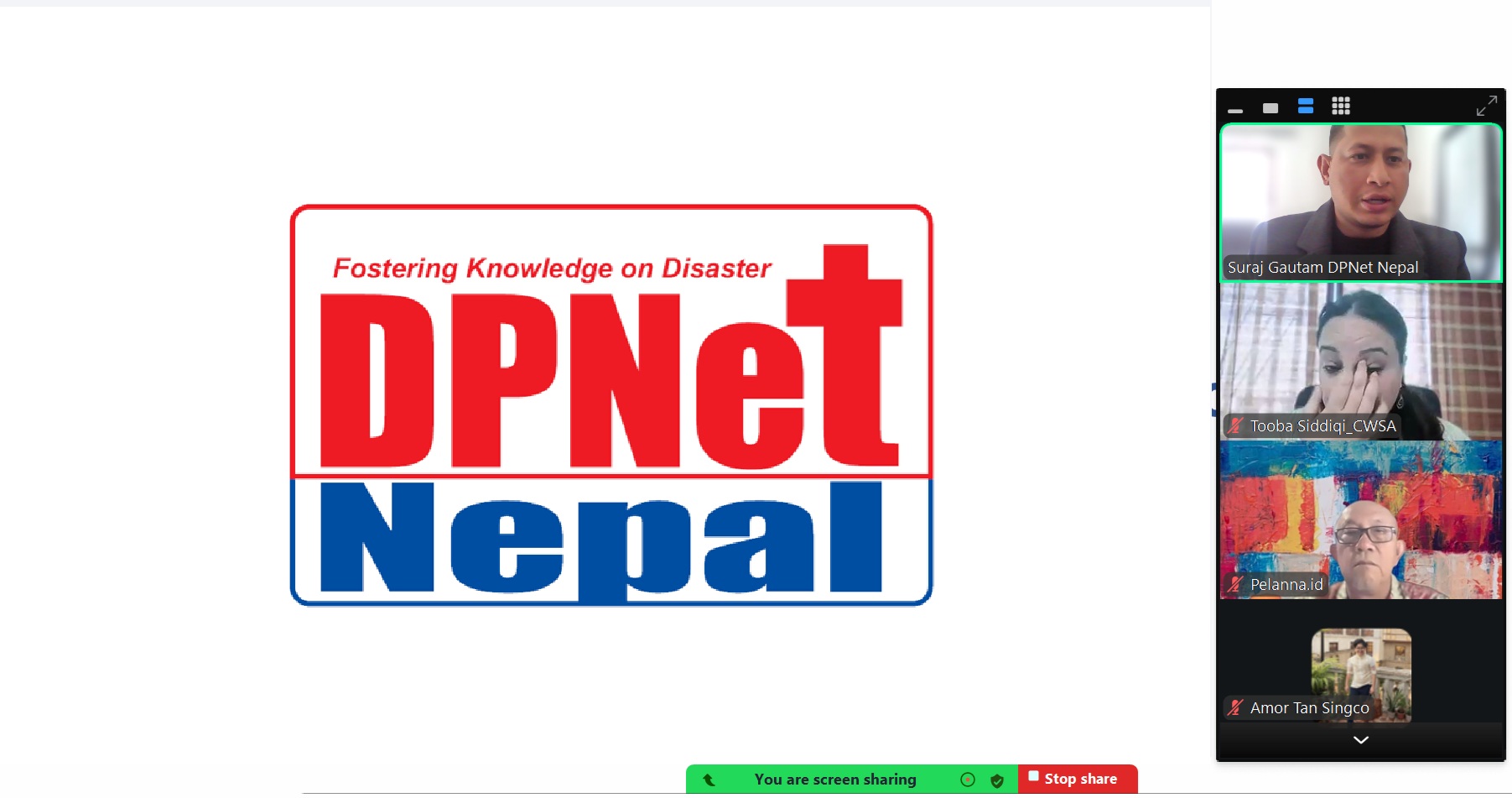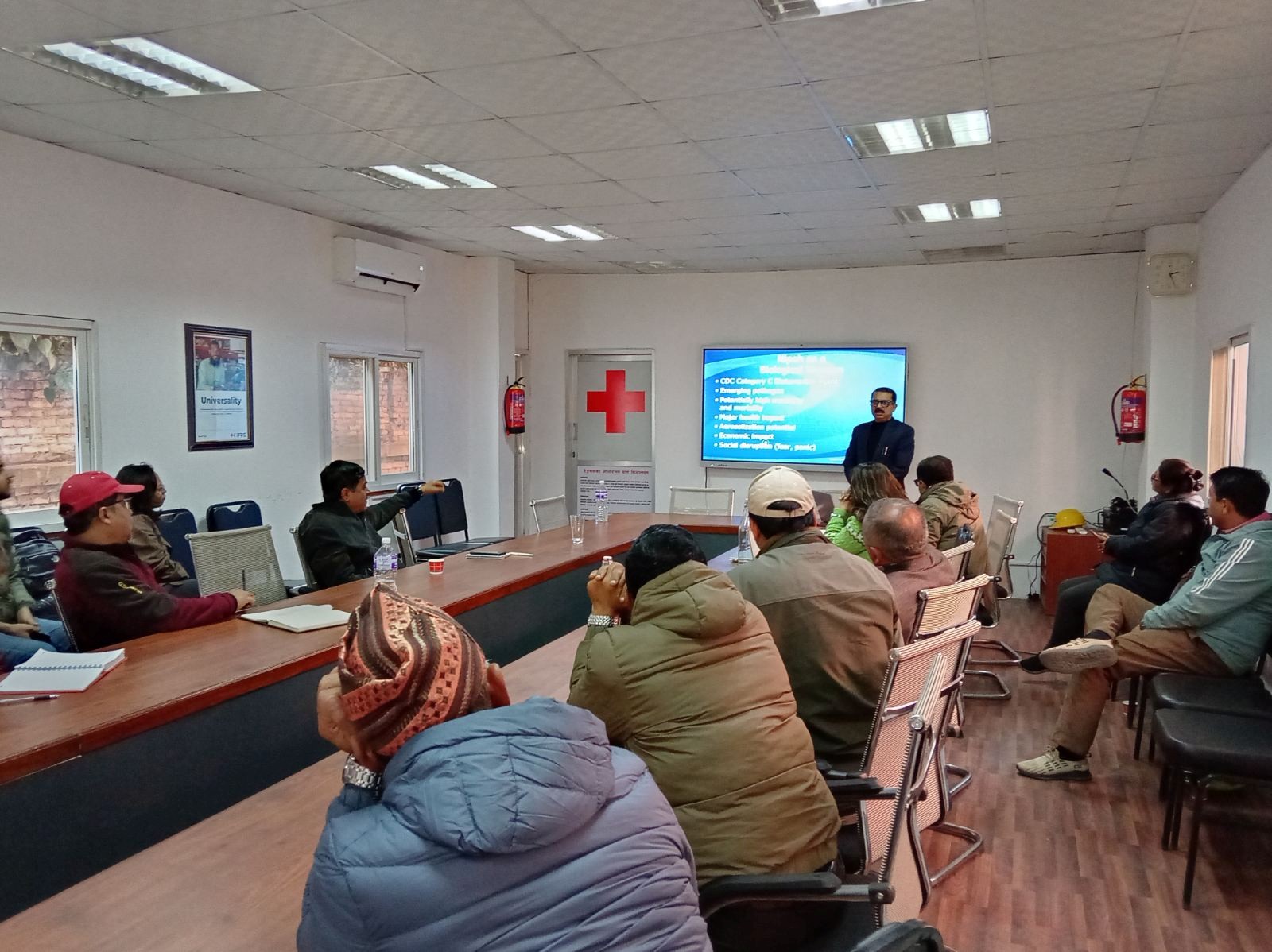Discussion Program on DRR Governance Held in Biratnagar

On 22 September 2024, a discussion program on Disaster Risk Reduction (DRR) governance was organized jointly by ARWSO Nepal, DPNet, DiMaNN, and NGO Federation in Biratnagar. The event, held in the context of increasing disaster risks, brought together key stakeholders from various sectors, including representatives from NGOs, media, and the private sector. The program was chaired by Lakhan Lal Shah, representing the NGO Federation of Koshi Province. Hon. Ram Dev Yadav, the Chairperson of the Industry, Tourism, and Environment Committee of the Koshi Province, attended as the Chief Guest, while Koshi Province Assembly member Hon. Jaya Prakash Chaudhary was present as the Distinguished Guest.
The program featured notable speakers, including Jit Ram Lama, the Immediate Past President of the NGO Federation, Dr. Raju Thapa, the Chairperson of DPNet, and Mr. Surya Bahadur Thapa, the IPP of DPNet and Chairperson of DiMaNN. Dr. Thapa delivered an insightful presentation that provided an overview of Nepal's disaster management scenario, highlighting significant issues in DRR governance, particularly in rural areas.
In his presentation, Dr. Thapa emphasized various important issues affecting rural Nepal's disaster management framework. These issues included the increasing vulnerability to climate change, lack of preparedness at the local level, inadequate funding for DRR initiatives, and the need for community-level awareness programs. He also highlighted the poor integration of disaster management into local governance systems, insufficient early warning systems, and the absence of anticipatory action frameworks. Furthermore, Dr. Thapa pointed out the challenges of coordination between local governments, the private sector, and civil society organizations, emphasizing the urgent need for capacity building in rural areas.
He used visual aids including video and photo to portray the harsh realities of disaster management in Nepal, showing the widespread impact of disasters on rural communities. The presentation also covered the significant overlap between DRR and climate change adaptation, urging for a more holistic approach to tackle both issues simultaneously. Dr. Thapa stressed the importance of addressing structural weaknesses in governance, mainstreaming DRR into local and national planning processes, and integrating indigenous knowledge to ensure more effective disaster responses in rural Nepal.
Mr. Surya Bahadur Thapa, in his presentation, provided solutions to many of the problems raised by Dr. Thapa. He introduced various national-level networks such as DPNet and DiMaNN, which are instrumental in advancing disaster management initiatives in Nepal. He also discussed the need for anticipatory action and shock-responsive social protection systems to mitigate disaster risks. Emphasizing the importance of early warning systems, he urged stakeholders to adopt cost-effective measures that leverage indigenous knowledge and practices. He also highlighted the significance of effective DRR governance, stressing that better coordination, networking, collaboration, and partnerships among government agencies, civil society, and the private sector are crucial for building resilience in rural areas.
Risk mapping, a critical tool for DRR, was another area of focus in Mr. Thapa’s presentation. He stressed that risk mapping should be localized and tailored to the specific needs of rural communities, many of which are situated in disaster-prone areas. By identifying vulnerable populations and high-risk zones, local authorities and organizations can prioritize interventions and allocate resources more effectively.
Jit Ram Lama, the IPP of the NGO Federation, shared his perspectives on the current state of disaster preparedness in Nepal. He pointed out that despite the increasing frequency and intensity of disasters, there remains a lack of adequate investment in preparedness efforts. Lama stressed the need to sensitize not only government bodies but also communities and households to the importance of disaster preparedness. He called for a renewed focus on localization, noting that DRR efforts must begin at the community level.
Mr. Lama also addressed the need to mainstream DRR into all spheres of work, particularly within the governance framework. He cautioned against the prevalence of corruption during disaster response efforts, highlighting the role of CSOs in ensuring transparency and accountability. He urged civil society to take the lead in advocating for better governance in disaster management and to integrate DRR considerations into their work across various sectors.
Hon. Jaya Prakash Chaudhary expressed concern about the current focus on disaster response, highlighting that preparedness, recovery, and rehabilitation are often neglected. He stressed that stakeholders, especially local governments and CSO, need to shift their focus toward these important areas to build resilience in communities. "We are focusing on response, but not enough on preparedness, recovery, and rehabilitation. Programs like this help sensitize stakeholders to the importance of a holistic approach to disaster management," Chaudhary said. He acknowledged the presence of local government representatives at the program and emphasized the role of CSOs in promoting preparedness initiatives, particularly at the grassroots level. He urged these organizations to lead efforts in educating communities about disaster risks and preparedness, ensuring that they are equipped to face future challenges.
Hon. Ram Dev Yadav, in his remarks as Chief Guest, stressed the need to mainstream disaster management into every sector of development. He addressed a common misconception that industries and tourism may not need to concern themselves with disaster preparedness, explaining that disasters can have devastating effects on these sectors. "You might not think industries or tourism need to care about DRR, but imagine if a tourist dies in the mountains due to a disaster—it could significantly decrease tourism numbers," Yadav stated. He pointed out that the impact of disasters on the tourism industry could harm Nepal's economy, which heavily relies on tourism revenue. Similarly, he noted that industries failing to account for disaster risks could face economic ruin in the wake of a catastrophe. Yadav also spoke about the increasing costs of climate change in Nepal, particularly for the country's rural communities. He emphasized that climate change is not just a national problem, but an international one that demands global cooperation. "Climate change is an international problem, not just a national one. Its effects are being felt across Nepal, and they are becoming increasingly costly,". One of the critical impacts of climate change mentioned by Yadav was the growing threat of Glacial Lake Outburst Floods, which endanger downstream communities. He also highlighted the depletion of underground water as a consequence of rising temperatures and erratic weather patterns, which are affecting water resources in many parts of Koshi Province. Furthermore, Yadav suggested that future such DRR programs should involve geologists and experts in environmental sciences to provide technical insights into the geological challenges that contribute to disaster risks in Nepal. “We need to have a geologist in such programs. Their expertise is important in understanding the geological factors that contribute to disasters and can guide us in creating more effective mitigation strategies,” Yadav added. His remarks highlighted the need for a multidisciplinary approach to disaster management, combining local knowledge with scientific expertise to address both natural and human-induced risks.
Program Chair Mr. Lakhan Lal Shah mentioned that NGO Federation Members are showing their readiness to work on disaster management. He requested all stakeholders to mainstream disaster managment in their every sphere of work and thanked all participants for their active participation in the program











